PRINCETON, NJ -- A review of recent research on healthcare cost, coverage, and quality reveals that Americans continue to be much more positive about their own personal healthcare situations than about the healthcare situation nationally. This suggests that Americans may be responding negatively to the new healthcare law at least partly because the majority don't perceive personal problems with their healthcare that urgently need addressing.
Here is a summary of five key elements of American public opinion about healthcare, based on Gallup's annual Health and Healthcare poll, conducted Nov. 7-10 this year.
1. Americans' views of their own healthcare coverage are quite positive, and much higher than the ratings they give healthcare coverage in the country more generally.
- While 69% of Americans rate their personal healthcare coverage as excellent or good, only 32% rate healthcare coverage in the country this highly.
- Americans became more positive about healthcare coverage in the country after Barack Obama took office, and continued to be more upbeat after the healthcare law was passed in 2010, although ratings have been lower in two of the last three years. Positivity spiked in November 2012 just after the presidential election.
- Americans' ratings of their own healthcare coverage have remained remarkably steady over the past decade -- and always much higher than their ratings of the nation's coverage.
- If Americans believe that the new healthcare law will improve healthcare coverage, most will likely feel this benefit is needed more for others than for themselves, given the relatively high existing personal satisfaction with healthcare coverage.
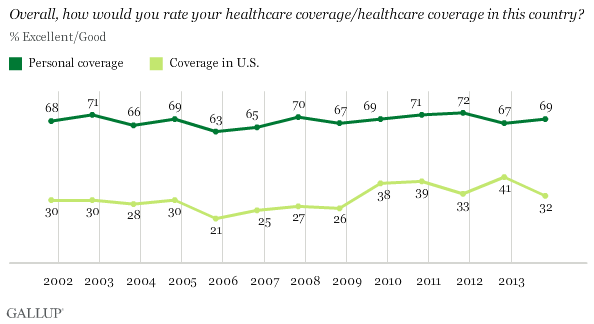
2. A majority of Americans remain satisfied with the cost of their healthcare -- again much higher than their satisfaction with the cost of healthcare more generally across the nation.
- Gallup first asked Americans about the cost of healthcare in the U.S. in 1993, when President Bill Clinton and first lady Hillary Clinton focused on introducing a national healthcare plan. At that point, only 8% of Americans were satisfied. Satisfaction with healthcare costs has been higher over the past decade or so, ranging from 17% to 28%, with the current 24% slightly above the average since 2001.
- This low level of satisfaction with the cost of healthcare in the U.S. is evident in the latest results on what Americans see as the most urgent health problem facing the nation. Americans this year for the first time since 2006 named cost as the country's top health issue.
- Satisfaction with the cost of one's own healthcare was at its highest in 2001 and dipped slightly in 2006, but has been at 59% for the last two years, identical to the average since 2001.
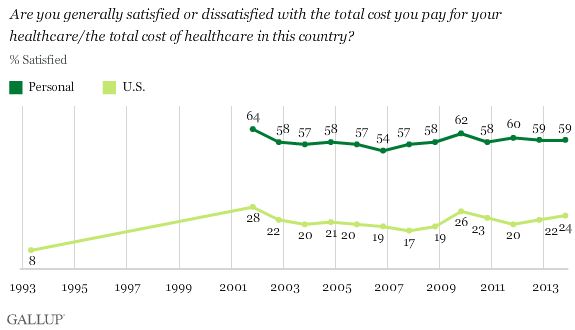
3. Americans are quite positive about the quality of healthcare they personally receive. Their ratings of healthcare quality nationally are less positive, but still in majority territory.
- Fifty-four percent of Americans rate the quality of healthcare in this country as excellent or good, down slightly from previous years. This measure has fluctuated somewhat since 2001, from a high of 62% in 2010 and 2012 to a low of 53% in 2001 and 2005-2006.
- Almost eight in 10 Americans (79%) rate the quality of healthcare they personally receive as excellent or good, roughly at the average on this combined positive measure since 2001. During that time, however, some Americans with positive attitudes have shifted their assessments from the "good" category to "excellent." Currently, 39% rate their healthcare quality as excellent and 40% rate it as good; as recently as 2007, it was 33% excellent and 50% good.
- Americans' highly positive ratings of healthcare quality -- both personal and national -- contrast with their lower ratings of healthcare cost and coverage. These findings reinforce a conclusion that Americans' issues with healthcare today are not so much about the actual treatment they receive, but more about how that treatment is paid for.
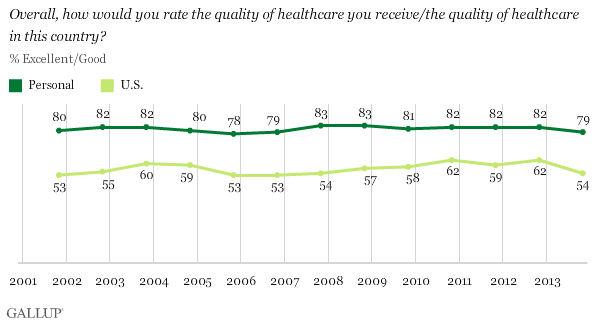
4. Most Americans do not believe that the U.S. healthcare system is in crisis, but they do think it has major problems.
- Although the majority of Americans believe the U.S. healthcare system has major problems, about one in five perceive that it is in a state of crisis.
- These views have not shifted significantly since 2002, and they are roughly in line with where they were in September 1994 amid the Clinton administration's attempts to pass comprehensive healthcare legislation. The lone exception was a survey conducted in November 2001, two months after the 9/11 terrorist attacks, when Americans were significantly less negative.
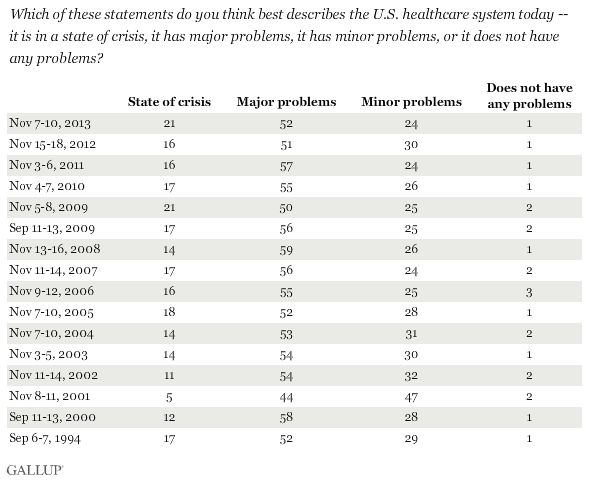
5. Americans now view healthcare as the second-most-important problem facing the country.
- More than twice as many Americans now mention healthcare as the nation's most important problem than was the case just a few months ago, most likely reflecting the focus on the healthcare law and healthcare insurance exchanges when the survey was conducted in early November.
- This spike in healthcare as the country's top problem follows the pattern seen in 1993-1994 and again in 2009-2010, which were times when news coverage was highly focused on attempts to pass new healthcare legislation. Still, the percentage of Americans saying healthcare is the most important problem is lower today than during either of those times.
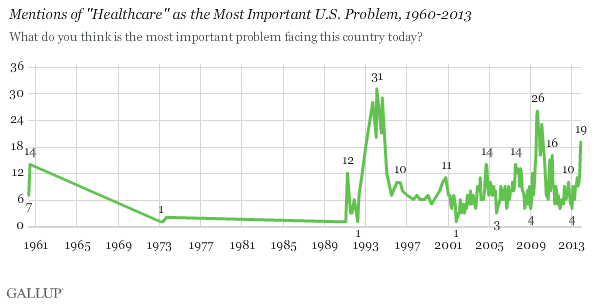
Bottom Line
Americans remain generally positive about the quality of healthcare they personally receive, their healthcare coverage, and what they pay for healthcare. They are significantly less positive about these healthcare issues for the nation as a whole. This disparity in perceptions of how things are going personally vs. nationally is not unusual for various social and mood issues, but highlights that the current efforts to reform healthcare are taking place even as the majority of Americans give their own healthcare relatively high ratings.
Additionally, the trends in Americans' assessments of their personal healthcare situation have been highly stable in recent years, suggesting little increase in personal worry. These findings may help explain why the healthcare law has never been highly popular, even before the recent troubles in implementing it; many Americans simply feel that their healthcare situation is fine as it is.
Survey Methods
Results for this Gallup poll are based on telephone interviews conducted Nov. 7-10, 2013, on the annual Gallup Health & Healthcare poll, with a random sample of 1,039 adults, aged 18 and older, living in all 50 U.S. states and the District of Columbia.
For results based on the total sample of national adults, one can say with 95% confidence that the margin of sampling error is ±4 percentage points.
Interviews are conducted with respondents on landline telephones and cellular phones, with interviews conducted in Spanish for respondents who are primarily Spanish-speaking. Each sample of national adults includes a minimum quota of 50% cellphone respondents and 50% landline respondents, with additional minimum quotas by region. Landline and cell telephone numbers are selected using random-digit-dial methods. Landline respondents are chosen at random within each household on the basis of which member had the most recent birthday.
Samples are weighted to correct for unequal selection probability, nonresponse, and double coverage of landline and cell users in the two sampling frames. They are also weighted to match the national demographics of gender, age, race, Hispanic ethnicity, education, region, population density, and phone status (cellphone only/landline only/both, and cellphone mostly). Demographic weighting targets are based on the March 2012 Current Population Survey figures for the aged 18 and older U.S. population. Phone status targets are based on the July-December 2011 National Health Interview Survey. Population density targets are based on the 2010 census. All reported margins of sampling error include the computed design effects for weighting.
In addition to sampling error, question wording and practical difficulties in conducting surveys can introduce error or bias into the findings of public opinion polls.
View methodology, full question results, and trend data.
For more details on Gallup's polling methodology, visit www.gallup.com.
